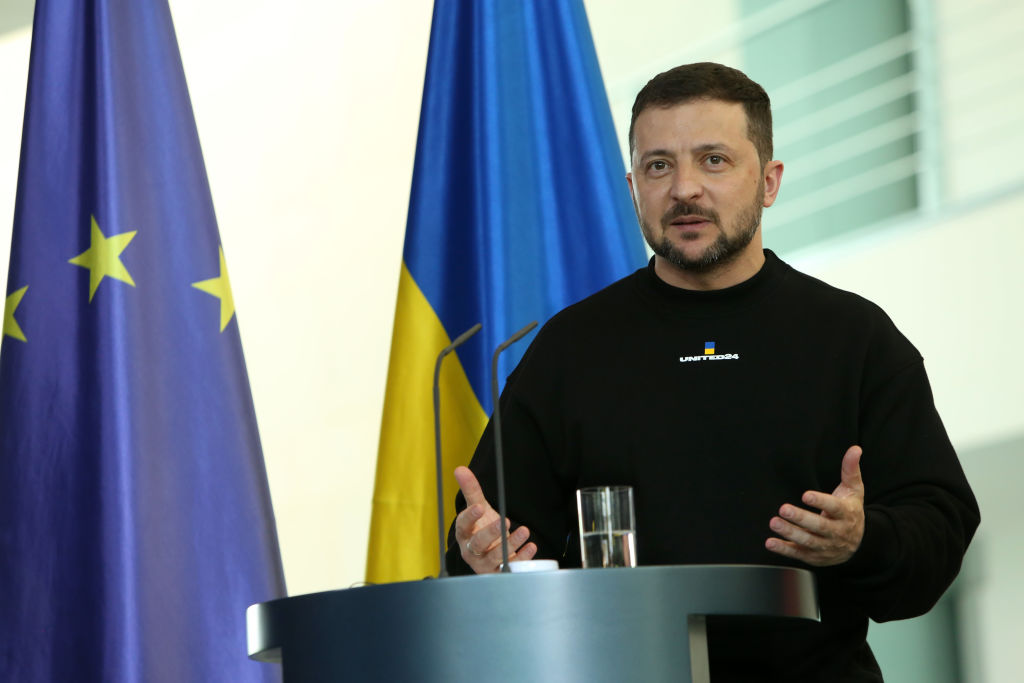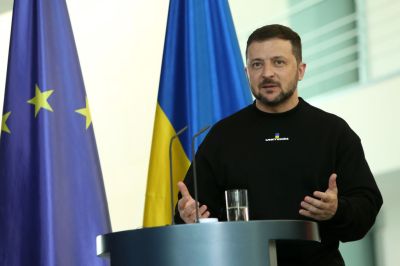Avril Haines, the director of national intelligence, testified before Congress in early May that the toll of Vladimir Putin’s disastrous and unprovoked war of aggression made it unlikely that Russia could sustain further offensive operations in Ukraine over the next year. Just days later, the May 9 Victory Day Parade in Moscow seemingly backed up her claims: Today’s Red Army could spare only one World War II-era T-34 tank at the head of a column of armored personnel carriers to mark the occasion. The Russian military that existed before the war has been obliterated. This is one of the biggest bargains imaginable given the relatively low cost of inflicting devastating losses on one of America’s two near peer rivals.
American (and NATO) assistance, and the losses suffered by the invading Russian forces, have not, however, been sufficient to help Ukraine win the war. The fighting continues. The Ukrainians have made clear that they need additional support, in particular additional air defense assets (which have been depleted by repeated Russian missile and drone attacks), long-range missiles, and high-performance fighter aircraft F-16s to accompany the ammunition for HIMARS and other artillery pieces. The Biden administration, wary of provoking Russia too much, has withheld some of these.
That said, the assistance has undoubtedly helped put Ukraine in a better position to pursue offensive operations against Russian forces on Ukrainian territory. There is now, however, another issue. The Ukrainians have expressed persistent concerns about ammunition shortages, and U.S. defense officials, in background comments to the press, have worried about depleting U.S. war reserve stocks. There is a way to address that problem: by providing Ukraine with the Dual Purpose Improved Conventional Munition (DPICMs) that it has requested. Ukraine has been waiting months for a response, but the administration has been silent.
The DPICM is a “cluster munition,” an artillery shell that carries 88 bomblets or “submunitions” that it delivers over a fixed area. Military experts regard it as perhaps five to 15 times more effective than the high explosive rounds that the U.S. and other allies have been supplying to Ukrainian forces. The DPICM allows “a smaller force to engage and degrade a larger enemy force,” and would be particularly useful in dealing with Russia’s numerical artillery advantage, as well as going after moving armored columns and entrenched defensive positions. Moreover, the U.S. holds some 3 million rounds of this ammunition in its inventory.
There are several reasons why the Biden administration appears to be hesitant to provide Ukraine with DPICMs, despite their clear military utility for its long-awaited counteroffensive against Russian forces.
The first is a humanitarian concern. Cluster munitions leave unexploded ordnance on the battlefield and frequently result in civilian casualties. A number of countries—including U.S. allies but not the U.S. itself—agreed to the Convention on Cluster Munitions signed in Oslo late in 2008. The U.S. declined to join the Oslo Convention because, as then-Acting Assistant Secretary for Political-Military Affairs Stephen Mull noted, the U.S. continued to rely on cluster munitions “as an important part of our own defense strategy.” Mull also said that, rather than joining the ban, the U.S. intended to pursue technological changes to ensure that “these weapons are no longer viable once the conflict is over.”
The Department of Defense subsequently issued a policy on the use of cluster munitions that reaffirmed their value as “legitimate weapons with clear military utility” while also acknowledging the need to minimize collateral damage to both civilians and civilian infrastructure. Absent cluster munitions, U.S. forces would be pressed to rely on massed fires that would likely create even more damage and destruction than the DPICM. The policy also set out a 10-year timeline to develop a new cluster munition with a dud rate of 1 percent rather than the 3 percent dud rate with the DPICM. (Disclosure: Co-author Eric Edelman was under secretary of defense for policy when this directive was adopted.)
Unfortunately, the 10-year timeline came and went without a replacement for the DPICM, and in 2017 the Department of Defense revised the 2008 policy and remanded the decision for use of cluster munitions to combatant commanders “in extreme circumstances to meet immediate warfighting demands.”
The humanitarian argument against providing DPICMs is that the U.S. should not contribute to civilian casualties in aiding Ukraine. The reality, however, is that Russia has apparently already used cluster munitions (with much higher dud rates than the DPCIM) in attacks throughout Ukraine. Eastern Ukraine will already require a massive cleanup effort after the war is over. Ukrainian use of DPICMs would be a drop in the bucket and arguably create less destruction and devastation than high explosive rounds. More pointedly, if the DPICMs help Ukraine win the war by ejecting Russian forces from its territory, civilian deaths will decline dramatically.
A second argument is that U.S. provision of DPICMs would undermine arms control norms. Both the Bush and Obama administrations expressed sympathy for the objectives of the Oslo Convention, despite the U.S. not being a signatory. But denying DPICMs to Kyiv forces it to observe rules its enemy is not bound by. U.S. policymakers will have to ask themselves whether playing by the Marquis of Queensbury rules makes sense if the cost is a long, bloody stalemate in Ukraine that just prolongs the already excruciating suffering of Russia’s victims in this war.
A final impediment to providing DPICMs regards our allies. Britain, France, and Germany, among many others aiding Ukraine, have all signed the Oslo Convention. Discussions with military officials from our close allies suggest that public opinion would not look kindly on the provision of cluster munitions to Ukraine. This should not be an insuperable obstacle. Russia’s continued barrage of missiles and drones against civilian targets provides an opening for U.S. private and public diplomacy to explain why these weapons are justified and the reasons why the potential, limited humanitarian costs are outweighed by the desirability of shortening the conflict.
The Republican chairs and ranking members of the House and Senate foreign affairs and defense committees sent a letter to Biden strongly arguing in favor of sending DPICMs to Ukraine. As their letter argues, providing Ukrainians with this capability would alleviate pressures on U.S. and allied supplies since much of the inventory is already stored at bases in Europe. DPICMs could help channel Russian forces onto terrain more suitable for precision targeting, and relieve Ukraine of some of the logistical challenges connected to heavy use of artillery. As the Ukrainians set the conditions for their long-awaited counteroffensive, we urge the Biden administration to provide them with these munitions now.






Please note that we at The Dispatch hold ourselves, our work, and our commenters to a higher standard than other places on the internet. We welcome comments that foster genuine debate or discussion—including comments critical of us or our work—but responses that include ad hominem attacks on fellow Dispatch members or are intended to stoke fear and anger may be moderated.
With your membership, you only have the ability to comment on The Morning Dispatch articles. Consider upgrading to join the conversation everywhere.